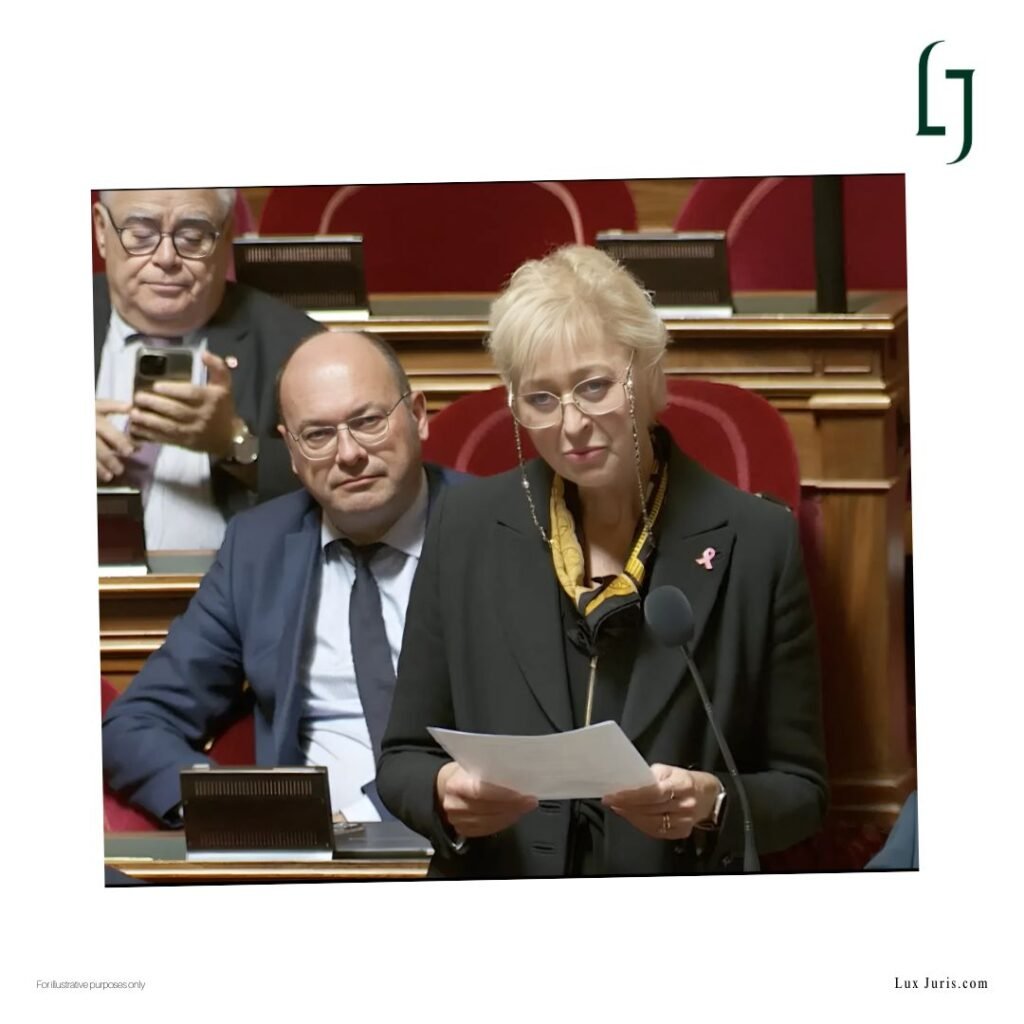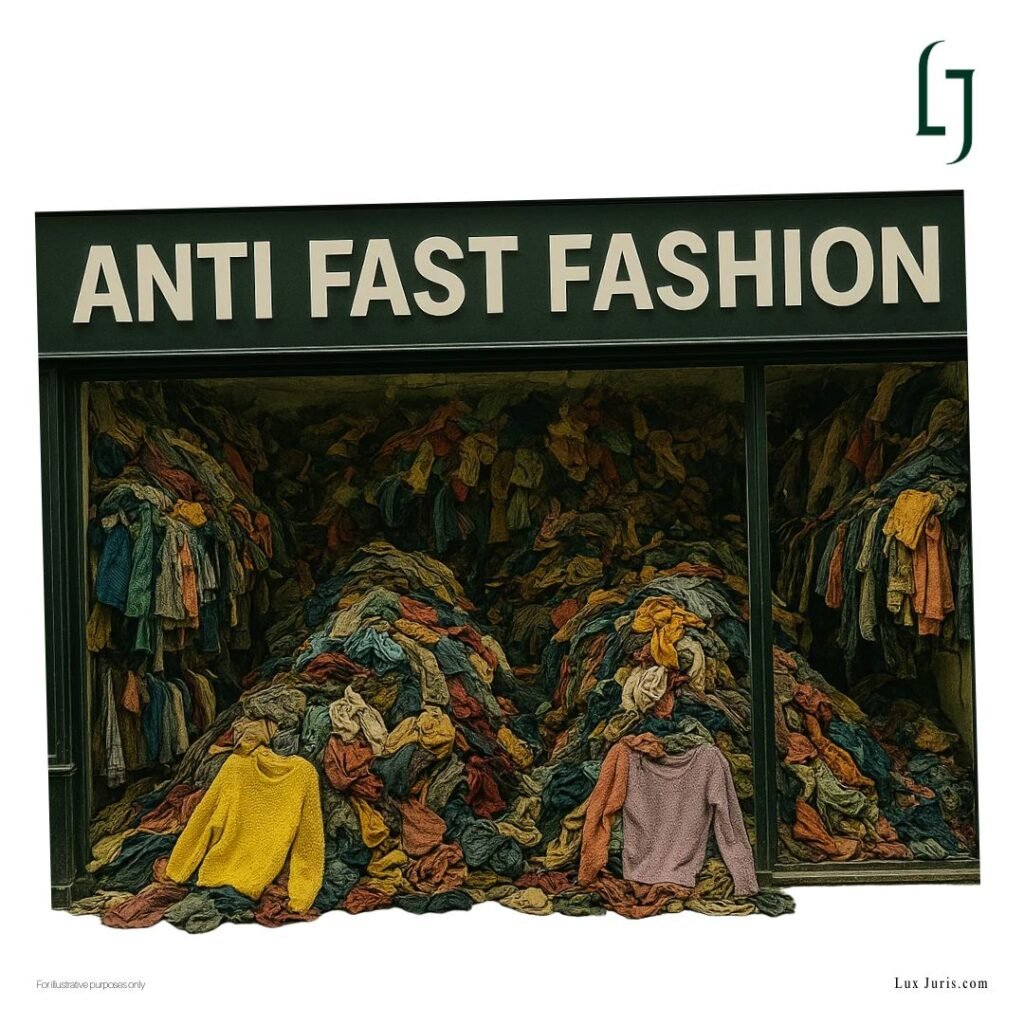Ecological Transition Minister Agnès Pannier-Runacher announced that France’s new law requiring clothing environmental cost labels empowers consumers, rewards sustainable producers, and counters the harmful impacts of ultra-fast fashion by increasing transparency and protecting domestic jobs.1
France is making a bold stand against the environmental and economic toll of fast fashion with its Fast Fashion Bill, a legislative step that is already sparking heated debate. While the law is designed to reduce the textile industry’s environmental footprint and raise consumer awareness, its main focus is ultra-fast fashion giants such as Shein and Temu.2 This selective approach raises questions over whether the bill is aimed at tackling overproduction across the industry, or whether it is designed to disadvantage the biggest players. Is this law the first step toward meaningful regulation that could shape the future of sustainable fashion?
Understanding the Fast Fashion Bill through Its New Rules
On 10 June 2025, the French Senate approved the Fast Fashion Bill by a 337–1 vote, marking one of the most significant attempts worldwide to regulate disposable fashion. The law introduces a series of measures against ultra-fast fashion, which floods markets with thousands of new designs and carries severe social and environmental costs.
Defining Ultra Fast Fashion
At the heart of the legislation is a new legal definition of “ultra-fast fashion,” a category that specifically targets brands characterised by introducing an excessive number of new designs alongside commercial and operational practices that actively shorten product lifespans, such as disincentivising garment repair3.
One of the bill’s most notable measures is an eco-tax system that places financial penalties on ultra-fast fashion items. Beginning in 2025, producers will pay a € 5 tax per item, increasing to € 10 by 2030, with the levy capped at 50% of the product’s value.4 This eco-modulation could be linked to the eco-score, a disclosure scheme introduced by the Loi Climate, which requires brands to publish data on environmental impacts such as water use, carbon emissions, and recyclability.5 Funds raised would support textile innovation and recycling programmes.6
Advertising Ban and Influencer Fines Shake Up Marketing
The bill also bans all advertising for ultra-fast fashion brands across digital and traditional media. Influencers promoting these brands could face high fines (possibly up to €100,000), a move that has sent shockwaves through the social media marketing world.7
To further discourage overconsumption, the legislation bans free returns on non-EU clothing orders and imposes special duties on international shipments, making it more expensive for consumers to indulge in disposable fashion.
The legislation is due to take full effect in January 2026, with eco-scores becoming mandatory by 2027. Yet enforcement remains a challenge, particularly for non-EU imports and influencer content. Without stronger oversight, critics warn the bill could fail to prevent greenwashing or ensure compliance. Businesses are already lobbying for delays, claiming the deadlines are unrealistic for global supply chains.
Does The Bill Have A Meaningful Sustainability Goal?
Criticism from Environmental Groups
Environmental organisations such as Friends of the Earth France argue the bill is too narrow. Pierre Condamine, a spokesperson, stressed that the law affects only around 10% of the market and fails to address the fashion industry’s wider environmental burden. He noted that companies such as Zara and H&M, though less extreme than Shein, still contribute heavily to ecological damage.
Protectionism vs Sustainability
While the French government frames the bill as an environmental necessity, some industry experts and activists see it as a protectionist play. Senator Sylvie Valente Le Hir, a key supporter of the law, argued that without such measures, French textile industries would face extinction due to the overwhelming scale of Chinese fast-fashion giants.

She stated that through this law they are preserving European industries, because Chinese textile giants operated until now without any restrictions; these restrictions, she noted, would safeguard some of Europe’s textile industries.8
Alignment with Existing Laws
The bill also fits into France’s broader legal framework, complementing the AGEC Law (2020), the Climate and Resilience Law (2022), and the Extended Producer Responsibility (EPR) scheme. These already impose environmental obligations on all fashion companies, both domestic and foreign, selling garments in France.
Effectiveness of the Eco-Tax
Another criticism concerns whether the eco-tax embodies a genuine “polluter pays” principle or simply adds a price tag to pollution. Unlike preventive measures that would restrict production or mandate sustainable methods, the tax allows harmful garments to continue being made and sold, provided the cost is absorbed.

The Final Stitch and What It Truly Means for Fashion’s Future
France’s Fast Fashion Bill stands as a landmark in fashion regulation and could pave the way for EU-wide measures, much like the AGEC Law, the Climate and Resilience Law, and the EPR scheme before it. Its real impact, however, is still uncertain. While it strikes directly at ultra-fast fashion, its selective scope and reliance on financial penalties leave important questions open. Will it genuinely cut fashion’s environmental damage, or will broader measures be needed to cover the rest of the market?
What is clear is that France is planting the seeds of a new era in fashion regulation, and the world is watching closely to see if the fabric holds.
By: Zsofia Voros and Yaël Dadoun
Sources:
2. https://refash.in/blogs/quick-reads/france-bans-influencers-from-promoting-ultra-fast fashion
4. https://esgnews.com/france-targets-ultra-fast-fashion-with-eco-tax-ad-ban-and-transparency-rules/
5. https://esgnews.com/france-targets-ultra-fast-fashion-with-eco-tax-ad-ban-and-transparency-rules/
6.https://pro.refashion.fr/sites/default/files/fichiers/GUIDE_ECO_CONTRIBUTION_2025_REFASHION_FR.pdf [1][1]
7. https://refash.in/blogs/quick-reads/france-bans-influencers-from-promoting-ultra-fast-fashion
